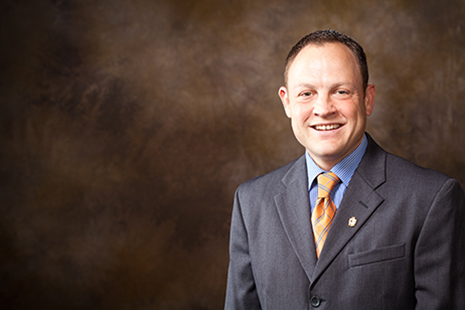Connect With History One Person at a Time

Jason Endacott, University of Arkansas. Photo credit: Russell Cothren, University of Arkansas.
FAYETTEVILLE, Ark. – Students may get close to seeing the world in another time period. Through historical empathy a group of secondary students transported their minds from their modern world to Harry Truman’s life during World War II to analyze how and why he made his presidential decisions.
Jason Endacott, assistant professor of curriculum and instruction at the University of Arkansas, addresses historical empathy and its effects on secondary students in his new article, “Negotiating the Process of Historical Empathy,” published in Theory & Research in Social Education.
According to Endacott, students experience historical empathy by intellectually and emotionally associating with the historical figure of study. By identifying with an individual of the past, the student may understand how that person thought, felt and behaved in response to a situation of the person’s time period.
“Historical empathy actually holds great potential for enhancing historical thinking,” Endacott wrote. “Students in this study incorporated cause and consequence, continuity and change, significance, agency and judgment in their process.”
In the study, Endacott instructed high school students about Harry Truman’s decision to deploy atomic bombs at the end of World War II. Materials included first-person narratives from Truman to help students humanize the past and see how Truman may have seen his present. Students initially experienced difficulty separating their minds from modern society and themselves, but as the study continued they became more analytical of the choices Truman made.
Students usually relate to historical individuals by gender, ethnicity, family background and life experiences, Endacott wrote. Identifying with these figures establishes a “sense of ‘shared normalcy.’”
Historical empathy revolves around keeping history in context, by understanding social and political trends, and the events that happened during or before those trends. Endacott wrote that empathy needs knowledge of the person’s upbringing, beliefs and actions. To connect, students consider what influenced past lives and situations by evaluating their own experiences.
Teaching with historical empathy requires four phases. The first phase, instruction, introduces students to the person and era of study. Next, the investigation phase, students find commonalities with the historical figure and try to see from that person’s perspective. The display phase involves understanding that perspective, and thus historical empathy. Last, the reflection phase uses that understanding in context and applies it to the present.
“Ultimately,” Endacott wrote, “we have to decide on whether the end goal of historical empathy is actually the achievement of ‘seeing the world as the historical figure did,’ or if we should push students to carry that achievement forward in the process of shaping their own view of the world.”
Endacott is an assistant professor of social studies education in the department of curriculum and instruction. His research focuses on how historical empathy can improve historical thinking in secondary social studies classrooms. He has published several articles in the journals Theory & Research in Social Education, The Social Studies and Social Studies Research and Practice.
Contacts
Jason Endacott, assistant professor of curriculum and instruction
College of Education and Health Professions
479-575-2657,
jendacot@uark.edu
Leah Markum, intern
University of Arkansas
479-575-5555,
lmarkum@uark.edu
Barbara Jaquish, science and research communications officer
University Relations
479-575-2683,
jaquish@uark.edu
Headlines
PetSmart CEO J.K. Symancyk to Speak at Walton College Commencement
J.K. Symancyk is an alumnus of the Sam M. Walton College of Business and serves on the Dean’s Executive Advisory Board.
Faulkner Center, Arkansas PBS Partner to Screen Documentary 'Gospel'
The Faulkner Performing Arts Center will host a screening of Gospel, a documentary exploring the origin of Black spirituality through sermon and song, in partnership with Arkansas PBS at 7:30 p.m. Thursday, May 2.
UAPD Officers Mills and Edwards Honored With New Roles
Veterans of the U of A Police Department, Matt Mills has been promoted to assistant chief, and Crandall Edwards has been promoted to administrative captain.
Community Design Center's Greenway Urbanism Project Wins LIV Hospitality Design Award
"Greenway Urbanism" is one of six urban strategies proposed under the Framework Plan for Cherokee Village, a project that received funding through an Our Town grant from the National Endowment for the Arts.
Spring Bike Drive Refurbishes Old Bikes for New Students
All donated bikes will be given to Pedal It Forward, a local nonprofit that will refurbish your bike and return it to the U of A campus to be gifted to a student in need. Hundreds of students have already benefited.




